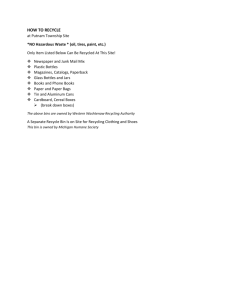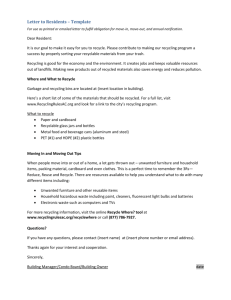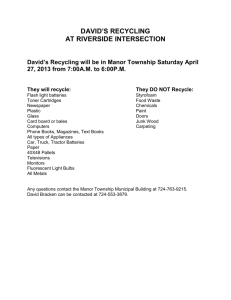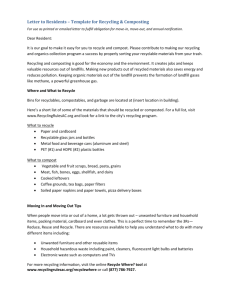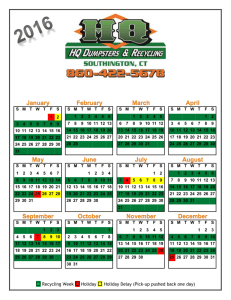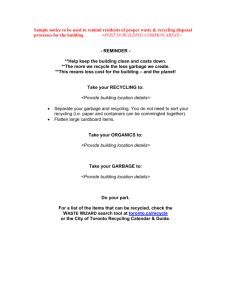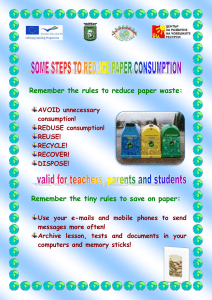Whatcom Community College
advertisement
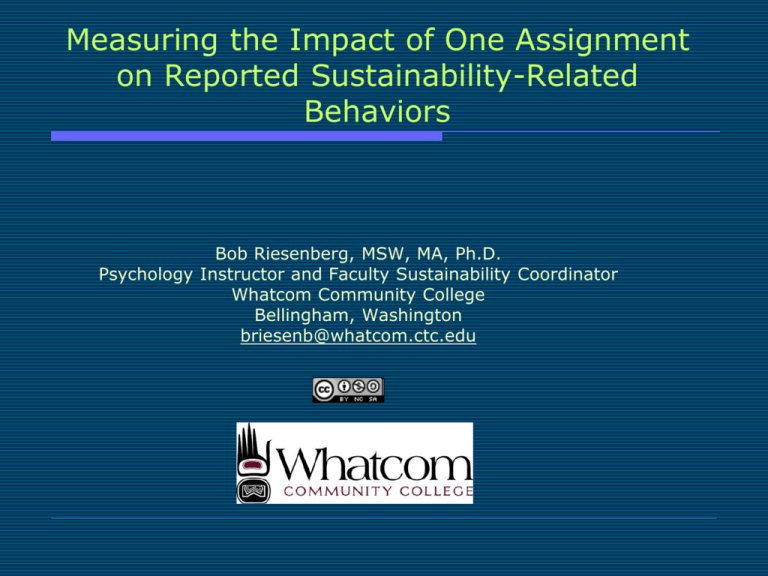
Measuring the Impact of One Assignment on Reported Sustainability-Related Behaviors Bob Riesenberg, MSW, MA, Ph.D. Psychology Instructor and Faculty Sustainability Coordinator Whatcom Community College Bellingham, Washington briesenb@whatcom.ctc.edu The Environmental Attitudes Survey by Bob Riesenberg,Whatcom Community College -1-----------2-------------3---------------4-----------------5-Strongly disagree Strongly agree Sample Items The earth exists primarily for humans to use for our own needs and desires. Environmental problems are a real threat to human wellbeing in the next few generations. I am concerned about the health of the earth’s ecosystems in the future after I am dead. Environmentalists are trying to make our country give up technology and be more miserable in the future. Environmental Problems & Human Behavior Assignment(1) Typical Resources Assigned (vary through the years) 1. Ecological Footprint web site to calculate one’s footprint and experiment with the impact of changing one’s behavioral choices. 2. The Story of Stuff” at http://www.storyofstuff.com/ is a 20 minute video describing the life cycle of the things we buy 3. “Ecological Intelligence” on PBS’s “Bill Moyers Journal” is an interview with Daniel Goleman who also described Emotional Intelligence in the 1990’s. This 20 minute video also addresses the life cycle of products we buy. http://www.pbs.org/moyers/journal/05152009/watch2.ht ml Environmental Problems & Human Behavior Assignment (2) 4. National Geographic’s Green Guide for things to do to reduce one’s impact on ecosystems. 5. The Natural Resources Defense Council web site (NRDC) describes characteristics of sustainable communities and offers advice on recycling. 6. The Good Guide provides ratings for the overall environmental impact of various products we but routinely. It enables comparison shopping according to the three components of sustainability: ecological health, economic viability, and social equity. 7. Chief Seathl’s speech of 1855 is often cited as a wellspring of inspiration for environmentalists. The city of Seattle was named after him. The speech’s ideas have appeared in several versions over the years. Go to: http://www.onevillage.co.uk/Chief-Seathl.htm Environmental Problems & Human Behavior Assignment (4) Writing your response to this topic Address the following in your ecological footprint section 1. Describe your ecological footprint size and the reinforcers for your behavior that have influenced its size in the various categories. 2. What values and beliefs do you hold about the effects of your behavioral choices in each category, and how do they impact the value of the reinforcers for your behaviors in each category? 3. What aversive outcomes and barriers maintain your behaviors or keep them from changing to lower your footprint? Environmental Problems & Human Behavior Assignment (5) 4. How can your ecological footprint be reduced and how might the required behavior change be encouraged through reinforcers and punishment (aversive outcomes or conditions)? (2 points) 5. How does the information in the various resources used in this assignment influence the power of reinforcers for changing your behavior? You must show knowledge of the videos, required files, and web site resources by naming and describing how each might influence behavior. (2 points). Environmental Problems & Human Behavior Assignment (6) Section 2: Compare the values and beliefs about the role of humans in the world expressed in Chief Seathl’s speech with those of American society in general. How is Chief Seathl’s worldview different from your own and from the dominant North American worldview? What effect would Chief Seathl’s worldview have on the power of reinforcers for Americans as they choose their behaviors regarding transportation, recycling, and the products we buy? How would Chief Seathl’s worldview influence our governments’ policies about these issues if it was the dominant view in this country? Environmental Problems & Human Behavior Assignment Summary The student’s writing assignment: 1. Describe your Ecological Footprint 2. Identify the behavioral reinforcers, aversive outcomes, and barriers that influence your behavior. Describe your personal values and beliefs that influence the power of the reinforcers and aversive outcomes for you. 3. Explain the reinforcers, aversive outcomes, and barriers that support your current ecological footprint and make it difficult to reduce. 4. Compare the worldview described by Chief Seathl with the dominant American or Canadian worldview. 5. Describe your view of this assignment. Attitude change results summary (1) All 35 attitude statements were rated closer to the sustainability pole in the Post-assignment condition than in the Pre-assignment condition. The difference is statistically significant (p < .05) in 11 of the 35 attitude scales. The assignment reliably causes statistically significant movement in attitude ratings toward the sustainability pole (every section of the course over four years) . The change persists to the 6th week after the assignment. Females score higher than males toward the sustainability pole. Attitude change results summary (2) Faculty are able impact student attitudes by integrating sustainability-related issues into existing courses with even one assignment. Attitude change persists at least through the 6th week after the assignment at the end of the academic quarter. Gender is an important variable in environmental attitudes in this study. Females score closer to the sustainability pole on all of the attitude ratings in this study. In 21 of the 35 attitude scales, the gender difference is statistically significant (p < .05). Attitude change results summary (3) There are no discernible patterns in the scores on any attitude scale related to: student age credits completed before the quarter began across the 10 academic quarters of the study from 2004 to 2008. Sustainable Behavior Survey October 2008 – March 2012 Sample Items Recycling 1= never; 2= rarely; 3= occasionally; 4= most of the time; 5= always; 0 = I do not know _____Recycle paper _____Recycle glass _____Recycle aluminum beverage cans _____Recycle plastic bottles Political action I volunteer time to one or more environmental organizations I urge others to support sustainable behavior and issues. Sustainable Behavior Survey October 2008 – March 2012 Sample Items 1= never; 2= rarely; 3= occasionally; 4= most of the time; 5= always; 0 = I do not know Product Purchasing Buy Organic food Buy locally grown food Buy bottled water Eat beef once a day or more Conserve resources Set home thermostat at 68 or lower in winter Keep shower time short to conserve water Turn off computer when not to be used for a few hours Sustainable Behavior Survey Sample Items Support for Issues (intentions and attitudes) 1= Strongly disagree; 2 = Disagree; 3 = Neutral; 4 = Agree; 5 = Strongly agree I do as much for sustainability as I should be expected to do. Doing “sustainable” behavior does little good. I see no real problem with supply of energy or other resources. My use of the earth’s resources is NOT a moral issue. I support restructuring the tax system to reward sustainable purchases and practices. I would pay more for more sustainable products if they were easily available and identifiable. Sustainable Behavior Survey Results Factor 1: Recycler Pre-mean=74.3%; st.dev.= 19.0 Pre-Post Score difference: p = .059 FACTOR 1 “The Recycler” : 15.8% variance explained Recycle glass Recycle aluminum Recycle plastics Recycle food cans Recycle paper Recycle cardboard I already recycle everything recyclable Sustainable Behavior Survey Results Factor 2: Malarkey Pre-Mean=39.4%; St.dev.= 12.9 Pre-Post Score difference: p = .880 FACTOR 2 “Malarkey” Factor (3.9% variance explained) Recycling is not worth doing because it has little impact on overall resources usage Recycling is not worth doing because the materials go to the dump anyway or sit in piles that are not used. Recycling does not help anything because it takes more energy to recycle than to use new materials. Sustainable behavior does little good Sustainable behavior is too much trouble I do not perform sustainable behaviors because I see no problems of energy or resource supplies My use of the earth’s resources is not a moral issue. Sustainable Behavior Survey Results Factor 2: Malarkey (cont) Pre-Mean=39.4%; St.dev.= 12.9 Pre-Post Score difference: p = .880 I do not perform sustainable behaviors because my actions are insignificant to the problem. I am pessimistic about the future of humanity and ecosystems; there is no reason to conserve. Recycling is too much trouble or time Recycled materials are poorer quality than materials made of “virgin” or new resources. Recycling is too messy to deal with Sustainable Behavior Survey Results Factor 3 Green Consumer Pre-Mean=53.3%; St.dev.= 17.5 Pre-Post Score difference: p = .048 Factor 3 Green Consumer (3.6% variance explained) I consider the impact of a product’s manufacturing before buying I consider a product’s environmental impact before buying. I consider the environmental impact of the disposal of a product before buying it I consider the environmental impact of using the product before buying it. I already look for recycled materials routinely and use them when available Sustainable Behavior Survey Results Factor 3 Green Consumer (cont) Pre-Mean=53.3%; St.dev.= 17.5 Pre-Post Score difference: p = .048 I buy recycled paper for stationery I consider the amount of packaging used in my decision to buy a product. I buy low-impact cleaning supplies I buy paper with at least 30% recycled content for computer paper A politician’s views on environmental issues is important to my decision on who to vote for. Sustainable Behavior Survey Results Factor 4: The Life-Cycle Assessor Pre-Mean= 72.4%; st.dev.= 15.7 Pre-Post Score difference: p = .650 Factor 4 Life cycle Assessor (2.7% variance explained) I would pay slightly more for lower impact products if there was a clear, accurate rating system I would pay slightly more for more sustainable products if they were easily available and identifiable. I support restructuring the tax system to reward sustainable practices in organizations and individuals. Future generations will judge my generation negatively because of our level of consumption and pollution. Sustainable Behavior Survey Results Factor 5: The Activist Pre-Mean= 35.2%; st.dev.= 14.9 Pre-Post Score difference: p = .726 Factor 5 The Activist (2.5% variance explained) I volunteer my time to environmental organizations or causes. I donate $$ to environmental organizations I write letters to politicians on environmental issues to urge sustainable practices I urge others to support sustainable behavior and issues Factor Score Correlations Factor Score Correlations Factor 1 Recycler Factor 1 Factor 2 Factor 3 ** ** ** ** ** ** ** ** ** Factor 2 Malarkey -.45 Factor 3 Green Consumer .399 -.502 Factor 4 Life-Cycle Assessor .218 -.476 .494 Factor 5 The Activist .339 -.45 .609 Factor 4 ** .44 Matched Pre-Post Assignment Factor Scores Factor 1 Recycler and Factor 3 Green Consumer may have changed in the Post-assignment condition ANOVA Factor 1 Recycler Factor 2 Malarkey Factor 3 Green Consumer Factor 4 Life-Cycle Assessor Sum of Squares Between Groups 1230.179 Within Groups 168557.4 Total 169787.5 Between Groups 3.690 Within Groups 78548.419 Total 78552.109 Between Groups 1165.438 Within Groups 142955.5 Total 144121.0 Between Groups Within Groups Total Factor 5 The Activist Between Groups Within Groups Total 54.174 127768.8 127823.0 26.829 108764.1 108791.0 df 1 491 492 1 484 485 1 484 Mean Square 1230.179 343.294 F 3.583 Sig. .059 3.690 162.290 .023 .880 1165.438 295.363 3.946 .048 54.174 262.359 .206 .650 26.829 218.402 .123 .726 485 1 487 488 1 498 499 Conclusions (1) Behavior Variables’ Correlations with each are low; >.5 appear only in recycling ratings. Correlations of behavior variables with Age, college credits are very low. None > .13; most < .10 Apparently age and amount of college are not related to self-reported behaviors around sustainability . Conclusions (2) Recycling variables correlate highly with each other; all are between r=.51 to .75 Recycle paper, cardboard, glass, aluminum plastics, recycle food cans, already recycle everything, (-too much trouble or time). Apparently sustainability behaviors are relatively independent of each other. Influencing one behavior does not predict that other behaviors will also be predictably influenced Conclusions (3) Influence of Sex upon reported-behavior ratings Only one variable has P=<.05 for both males and females in Pre-Post test (Recycle paper). Both increased recycling. Males increased reported sustainable behavior in: Recycling paper, buying recycled paper, considering environmental impact of products, reduced buying of bottled water. Females increased reported sustainable behavior in: Recycling paper, buying Energy Star products, keeping showers brief to save energy, not running water when not using, considering use of earth’s resources a moral issue. Conclusions (4) ANOVA Sex & Pre-Post by ratings Males have 5 variables that changed with P=< .05 of 92 variables. Females have 5 variables that changed with P=< .05 of 92 variables. This is not very different from random variation. Sex influenced about 1/3 of the attitudes in the Environmental Attitudes Survey, but does not appear to be reliably influential in behaviors. Conclusions (5) Behaviors are more difficult to change than attitudes with an assignment. Recycling behaviors are the most likely behaviors to be changed with this assignment, even though the reported rate of recycling was quite high in the Pre-assignment condition. I have also found this to be true in previous research I have conducted. Changing one behavior is not a predictor that other behaviors have been influenced except in recycling behaviors. Efforts to change a broad range of sustainability-related behaviors may require assignments specifically targeted to the relevant specific behaviorrelated issues. Bob Riesenberg Whatcom Community College Bellingham, Washington 98226 All files are available on my faculty web site at: http://faculty.whatcom.ctc.edu/briesenb/ Select “Community College Sustainability webinar Jan. 21 2014” in left corner. Email: briesenb@whatcom.ctc.edu

